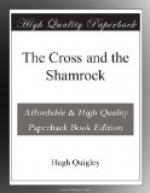“Thank God,” she cried, “I know what I am, or ought to be. Thank God I am Irish, too, for I often wished I belonged to that much-abused and persecuted people. But O, where shall I find my parents? or how came my lot to be cast in this proud palace, which, alas! I too long regarded as my home? O, who, who will restore this poor ‘exile of Erin,’ to the home of her unknown parents? How gladly would I exchange all the splendor of this place for the homeliest cot in that land of the shamrock and the cross; ay, the poorest ‘cabin, fast by the wild-wood,’ in the land of St. Patrick, and my unknown ancestors.”
Such were the soliloquies of poor, despised Alia, in her room on the third floor, where old aunt Judy, the negro, having missed her favorite from the grand company, after having sought her in vain in the lower saloons of the house, just entered her room.
“Dere, now, Miss Ali’, am poor aunt Judy half kilt from sarching for you all over. What make you be here, and all the gran’ gem’men asking for you?”
“Ah, aunt Judy, why have you all along denied of me all knowledge of my extraction, parentage, and race? Did you not know that I was Irish? and yet you always denied that I was, though I have suspected I was, and you must have known it, having lived so long in the family. This is not what I expected from you, aunt Judy,” she said, casting a look of gentle reproach at the old negro.
“O, dear, miss—O, dear,” cried the poor affectionate creature, bursting into tears; “don’t blame dis ole nigger, but massa and missus, and Miss Sillerman, sister to the missus who died last year. They forbid aunt Jude to tell who rosy-faced Ali’ was. I was bound to swear not to tell. If they knowed I did hab a parle vit you on de subject, they would turn poor ole Jude out de door to die in the poor maison.”




